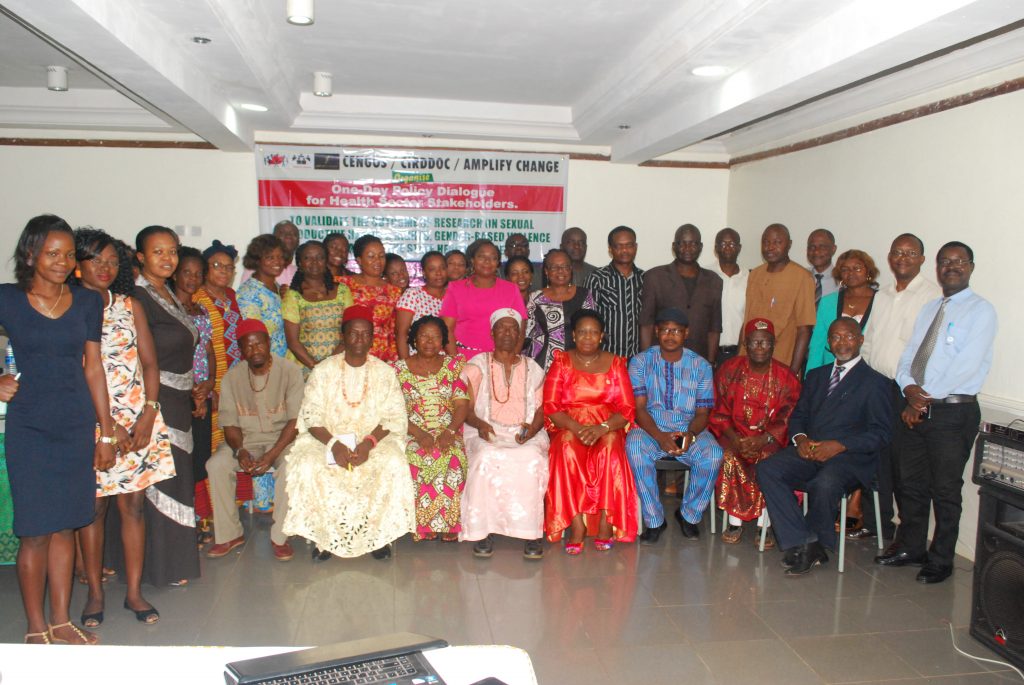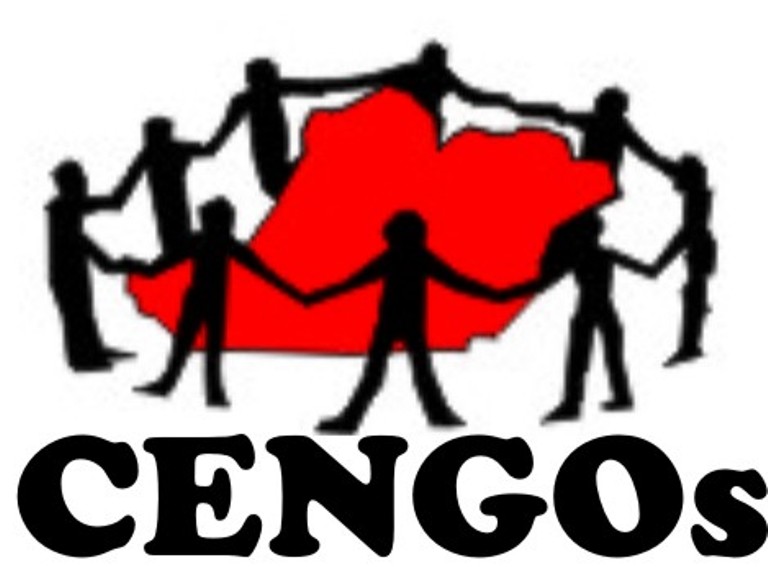About Us

The Coalition of Eastern NGOs (CENGOS) is an independent, non-governmental, not-for-profit, and non-political organisation comprising about 140 registered member-NGOs from the nine states of old Eastern Region of Nigeria, namely, Abia, Akwa-Ibom, Anambra, Bayelsa, Cross River, Ebonyi, Enugu, Imo and Rivers States. The coalition was formed in 1997 and formerly registered with the Enugu State Welfare Council of the Ministry of Women Affairs and Social Development on the 7th of June, 1999.
The network came into being in October 1997, at the end of a capacity
building workshop/consultative meeting of NGOs drawn from nine states of the defunct Eastern region of Nigeria facilitated by the Civil Resource Development and Documentation Centre (CIRDDOC) Nigeria. 65 NGOs/CBOs that participated in the meeting, which was supported by the World Bank, took a decision to establish a network of NGOs working in the nine states, irrespective of their thematic focus. It was not until 7th June 1999 that the then Coalition of Eastern NGOs (CENGOS) was formally registered by the Enugu State Welfare Council. The coalition had since applied to the Corporate Affairs Commission for formal incorporation.
Vision Statement
To have a society where all citizens have access to basic necessities of life, gender equity, justice and equal participation in governance.
Mission Statement
Promotion of human rights, gender equity, and good governance, for sustainable development.
Our Goal
To bring together like-minded NGOs working on issues of democracy and good governance, human rights, gender, environment and health,
Main Objectives
- Bring together NGOs in the old Eastern Region of Nigeria in a coalition for the purpose of collaborating and exchange of information, ideas and expertise;
- Collect, collate, anlayse, document and disseminate vital information of existing member NGOs;
- Keep the member NGOs informed of the current development in NGO world (locally and internationally);
- Promote human rights and women’s rights as well as activities and programmes of member NGOs that are in line with the objectives of the coalition;
- Explore opportunities for the enhancement of the capacity of member NGOs through training and resource development;
- Represent NGOs in the old Eastern Region of Nigeria in National and International forums where such representation is needed; and
- Present a common front on matters/issues that affect the welfare/activities of member NGOs within the region.
Specific Objectives
- To operate as a network/coalition for NGOs/CBOs in the Eastern Region of Nigeria.
- To promote opportunities for regional advocacy action for development.
- To promote access to justice, equity and good governance in Nigeria.
- To sensitize and create awareness about reproductive health and rights.
- To explore opportunities for the enhancement of the capacities of member-NGOs through training and resource development.
- To promote the activities and programmes of member-NGOs as well as facilitate collaboration with other relevant agencies both locally and internationally.
Strategies to Achieve Objectives
Main Activities in the Previous Years
In March 2000, CENGOs marked its inauguration with a three-day training workshop, entitled Social Mobilization: Advocacy and Lobbying, Mobilization, Communication and Management Skills. Part of the activities was a consultative meeting of NGOs with development partners. CENGOs launched the Directory of NGOs at the 2nd AGM in November, 2001 in Owerri, Imo State, with a training workshop on Alternative Dispute Resolution and a Tribunal on the Violation of Women’s Rights.
Between 2002 and 2003, CENGOs collaborated with Open Society Initiative for West Africa (OSIWA) Nigeria on the project “Towards the Domestication of CEDAW in Nigeria Through the Civic Forum Project”, to popularize CEDAW (Convention on the Elimination of all forms of Discrimination Against Women) at the grassroots level with the following components:
TOT for CENGOs leaders on CEDAW
- Step-down training on CEDAW by trainees in the nine states.
- Traditional rulers’ workshop
- Civic forum discussion project running simultaneously in nine states.
- Public hearing on affirmative action for increased women’s political participation.
- Media roundtable on affirmative action.
The project was successfully implemented and resulted in production of new CEDAW experts across the nine states, who are in a position to monitor compliance with its provisions in their respective communities. CEDAW is now a household name in these states, and at the grassroots level. Representatives of the traditional institutions in these states are now aware of CEDAW and its basic provisions of equality and human rights generally. The communiqué released by the traditional rulers who attended the Traditional Rulers Consultative Forum/Dialogue on CEDAW revealed their commitment to change things for the better in their communities particularly with respect to customary practices that deny women of their rights. The media in these states are now tuned in to the issues of human rights and women’s rights. Copies of the pamphlet on CEDAW were widely distributed. One of the outcomes of this project is that several NGOs in these states are now implementing projects that are in line with CEDAW’s objectives as they have acquired an in depth understanding of CEDAW. In fact, feedback reveals that the National Assembly is on the verge of domesticating CEDAW.
In 2004, CENGOS, in collaboration with CIRDDOC and with support from MacArthur Foundation, organized a Tribunal on Reproductive Health and Rights to improve maternal health and reproductive rights of women and young people in Nigeria. Between the year 2005 and 2009, CENGOS was supported by the Global Fund for Women to organize a number of activities around capacity building of members, human rights, women’s empowerment, public hearings at National Assembly to lobby for the domestication of CEDAW, as well as international travels to attend conferences.
Also included in the activities are Training of trainers for CENGOS members on CEDAW, Step down training on CEDAW by trainees in the nine member states, Traditional Rulers’ Workshop, Civic Forum Discussion Project running simultaneously in nine states, Public Hearing on Affirmative Action for increased women’s Political Participation, Media Round table on Affirmative Action, Publication of Pamphlet on the Convention on the Elimination of all forms of Discrimination against Women (CEDAW).
In the Year 2004, CENGOS published the proceedings of the traditional rulers’ workshop on Human rights and gender which it organised in the previous year as well as the proceedings of the Public Hearing on Affirmative Action it organised at the National Assembly titled “The Gender dimensions of Culture: Proceedings of the Traditional Rulers’ Workshop” and “Affirmative Action Strategies: Perspectives from Around the Globe”.
CENGOS has also benefitted for Global Fund for Women to implement the following projects – In 2005 GFW sponsored members to the CSW and to implement a post Beijing +10 activities. In 2008, GFW funded our participation in the Nigeria Social Forum. In 2010, GFW funded the participation of the members to CSW Beijing +15 review meeting.
During the year also, advocacy visits were paid on traditional rulers at state and local Government levels to follow up on the commitments they made at the traditional rulers’ workshop to modify and abolish local customs that discriminate against women.
The Civic Forum Discussion Project which started in year 2003 and ran simultaneously in nine states was rounded up in 2004 includes a civic education training and a recurrent educational session organized by trained Civic Educators with small groups of citizens aimed at creating opportunities for citizens to participate in the democratic process. Under this project, communities are encouraged to organise town hall meetings with their elected representatives to hold them accountable and hold discussions on thematic issues such as HIV/AIDS. Project activities were organised through workshops, drama, focused group discussions, posters and publications modulated within the cultural context of the communities. Each civic educator completes five discussion sessions in the communities every fourteen days. These are informal sessions.
CENGOS holds its AGM regularly. The 5th Annual General Meeting was held in December 2004. The nine states branches were represented by their coordinators and delegates.
In collaboration with CIRDDOC and Macarthur Foundation, CENGOS in 2004, carried out a tribunal on the reproductive health and rights of women and HIV/AIDS. The tribunal which was attended by representatives of NGOs, the Judiciary, Legislature, the Commissioner of Health, Special Assistant to the Enugu State Governor on HIV/AIDS, students from the Universities and secondary schools, representatives of the media, state coordinators and members of CENGOS, the Print and electronic media etc. was presided over by a Panel of three Judges consisting of a retired Judge of the High Court, a retired Professor of Law and a serving Chief Magistrate and facilitated by a Panel of three distinguished persons – a Consultant Physician, at the University of Nigeria Teaching Hospital, the Coordinator of the organisation of People Living with HIV/AIDS and an NGO Executive Director. There were testimonies on rape, trafficking, domestic violence, HIV/AIDS, HTPs including FGM, widowhood practices, Nrachi Nwanyi Custom etc.
Early in the year, in collaboration with CIRDDOC, the coalition organised a three days Peer Education Workshop on HIV/AIDS for secondary school students in Enugu State.
In 2015, the Amplify Change, a fund which aims to empower young people, men and women to realise their sexual and reproductive rights, recently approved a grant for the implementation of the project titled ‘Building bridges to end gender-based violence and increase young people’s access to sexual and reproductive health information and services’. The fund is to be managed by CIRDDOC and implemented through the Coalition of Eastern NGOs (CENGOS) in Imo, Anambra, Enugu, Ebonyi, Cross River and Rivers. Activities in the project include training of CSOs and traditional rulers on SRHR, an essay competition for secondary schools on SRHR, Step it Up campaign, Budget monitoring, among others.

Mrs Oby Nwankwo (Late)
Founding National Coordinator
